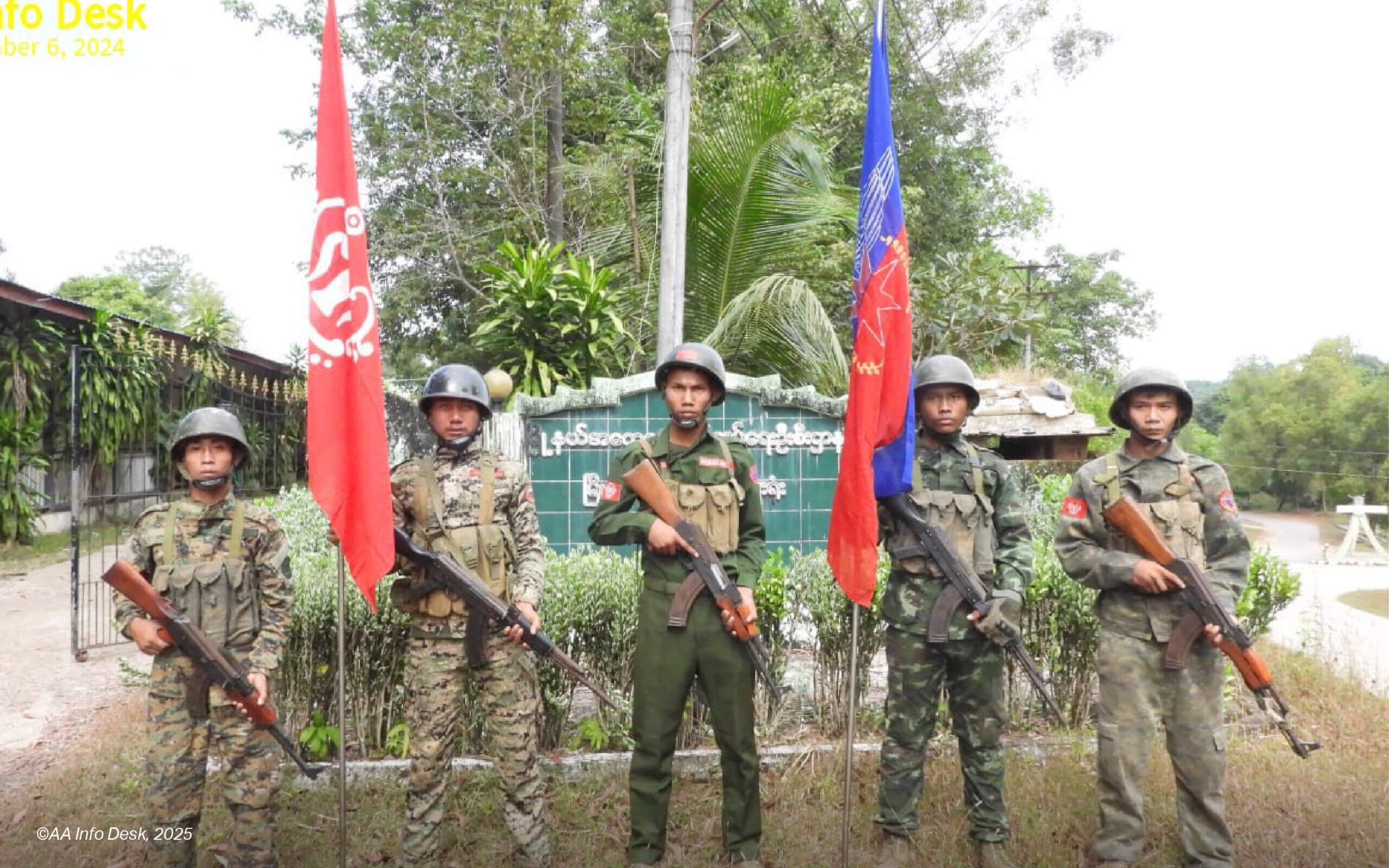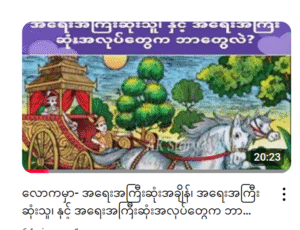New investigation details abductions, torture, killings, and beheadings of Rohingya civilians
(BANGKOK, July 23, 2025)— The International Criminal Court (ICC) should investigate war crimes, including abductions, torture, killings, and beheadings of Rohingya civilians committed by the Arakan Army (AA), a powerful ethnic resistance force fighting the Myanmar military junta in Rakhine State, Myanmar, Fortify Rights said today. A new investigation by Fortify Rights documents how the AA, which currently controls much of Rakhine State, has committed serious violations of the laws of war in ad-hoc detention centers and villages under its control.
“The Arakan Army is responsible for widespread abductions, brutal torture, and the murder of Rohingya, some of whom were found beheaded, in blatant violation of the laws of war,” said Ejaz Min Khant, Human Rights Specialist at Fortify Rights. “The International Criminal Court has jurisdiction and should investigate and prosecute perpetrators of serious crimes in Rakhine State, including from the Arakan Army.”
From April to July 2025, Fortify Rights interviewed 39 Rohingya individuals—including eight women—who survived and witnessed AA abuses in 2024 and 2025. Fortify Rights also viewed and analyzed photographic and video evidence of AA crimes.
Fortify Rights documented multiple killings of Rohingya civilians in villages and ad-hoc detention facilities controlled by the AA, including five apparent beheadings by AA forces. The findings also reveal a systematic pattern in which Rohingya individuals were abducted and subsequently tortured or killed in AA-controlled detention facilities and towns. Survivors reported being detained as a result of unwarranted accusations of links with Rohingya armed groups or as a result of refusing to join AA ranks.

Killings and Beheadings
“Ahmed,” a Rohingya, 21, told Fortify Rights how uniformed AA militants abducted his brother in March 2025, during Ramadan, saying:
On the 20th day of Ramadan, my brother was killed by the AA. My brother and our family were fasting. … There were 10-15 AA armed members wearing uniforms. They had long guns. I saw them take my brother. My entire family witnessed them take my brother from the house …. I saw them forcibly grab him. They were very angry. He was not willing [to go with them]. They were dragging him. They pushed me away. Both my parents tried to stop the AA men. My younger brother was kicked. My parents pleaded with the AA, “Where are you taking him? Please stop.” There is no way to get justice for what happened.
“The forest is behind my house. They took him into the forest,” Ahmed explained. Ahmed and some relatives later found his brother’s decapitated body in the forest. Ahmed told Fortify Rights:
We found him on the ground. He was packed inside an empty sack of rice. … His head was fully detached from his body. … We saw his head, and I could see that it was my brother.
The day after, the family held a rapid funeral before fleeing to Bangladesh.
In a separate case, a group of five Rohingya men were abducted by the AA from Abuja Hamlet in Tha Yet Oak village tract, in April 2024 and later found dead, with four beheaded and all their bodies showing signs of torture. A witness told Fortify Rights:
When I was looking at them hiding behind the bushes and trees, I saw that they caught Numal Hakim and Islam, and took them out of the fish pond area [where they were working]. …And then they caught [withheld], Abdul Amin, from the shore…. [The AA] took him to sit next to the two others. I kept looking at them, the sun was about to set. … I saw that three to four [AA] people were kicking and punching them hard. … They caught all five [men] … tied their hands, and took them away.
Less than a week later, the bodies of the five abducted Rohingya men were found in a man-made fish pond in Rohingya Daung village, also known as Ywet Nyo Taung, about one mile from where they were abducted. The witness recalled: “[A resident] went there to check the bodies, where they found them. You can listen to [his] voice in the video, which he recorded. They were beheaded, stabbed, and had other injuries.
The 18-second mobile phone video on file with Fortify Rights shows five bodies in a small pond, four of whom were beheaded.
In September 2024, a U.N. High Commissioner for Human Rights report documented the same incident: “On 17 April 2024, the Arakan Army detained five Rohingya men in northern Maungdaw. … locals found their severely mutilated bodies, with four having been beheaded.”
In another incident documented by Fortify Rights, a Rohingya man, 33, from Foteh Ali Fara [village] in Buthidaung Township, Rakhine State, recounted how the AA took his brother “Mohammed”:
In January 2024, between 9 and 10 p.m., AA rebels came to our house. …. On that night, a group of 15 AA members came and called my brother. He came out of the house. They didn’t tell him anything. He was just taken by the AA. They all had guns. … My mother asked the AA, “Where are you taking my son?” One AA militants replied, “We will return him.” Once the Rohingya are detained, you have to consider them disappeared or dead. We didn’t have an option to find him or inquire about him.
The man explained to Fortify Rights how, two months after the abduction, the AA came to his village and made an announcement saying:
The AA came after two months and said to the residents, “There are dead bodies in Boriyong village [also known as Bo Gyi Chaung village]. Go and find them.” I went with my elder brother to the field in Boriyong. It took about 45 minutes to walk. … I saw dead bodies in an open field. There were 12 dead bodies. They were all men from our village. Some of the dead bodies had gunshot wounds. All had bruises. My elder brother, Mohammed, had black and blue spots, as if he had been beaten very badly. … His face looked like it had been hit and had dried blood [on it].
Detention and Torture
Rohingya told Fortify Rights how they survived AA detention and torture. “Abdullah,” 21, told Fortify Rights that the AA abducted and tortured him in Boli Bazar, also known as Kyein Chaung village, in Maungdaw Township, in early May 2024:
They used bamboo, wire, and kicked and punched as strongly as they could. Four members of the AA came at once and beat me at the same time. One AA member would sit in front of me, on a yellow oil pot, and punch me in the face. Another AA member was beating me with a wooden stick on my back with all his force, just like playing golf. Once it hit my body, it bruised every time. The strikes with the wire immediately caused bruises and bleeding. And the ones with the stick caused painful internal injuries. I still have the scars on my body, as you can see [showing his scars]. They beat me more brutally than the other three [detainees].
He continued:
They made me sit in a squat position and then started beating my back with sticks, kicks, and punches from all angles. It was extremely painful that I had to shout very loudly every time. They put a cloth in my mouth so that I couldn’t shout. My mouth and nose were bleeding heavily. Then I fell on the ground and was unconscious.
The AA abducted and tortured, “Shofiq,” a Rohingya from Buthidaung Township, from January 2024 to November 2024. He told Fortify Rights:
On January 12, 2024, at 8 p.m., I was praying the Namaz [evening prayer] at the Hatkannya Fara [village] Mosque near my home. At that time, a dozen of the AA came with guns into the mosque and handcuffed me.
He continued:
Once I arrived at the [AA detention facility], they immediately put both my legs into shackles. I still have scars on my legs [showing his scars]. It was so cold. …The ground was dirt, and it had only a tarpaulin on it. I had to lie down just like that on the ground. They kept me there for several weeks.
… One of the AA members said, “We detained you because you’re a bad person. You send information to the junta military. Tell me, when did ARSA [the Arakan Rohingya Salvation Army, a Rohingya armed group in league with the junta military] come to your village?” They were accusing me of such baseless, untruthful, and disturbing claims. I said, “I have no knowledge or information on what you are asking.” Then they took a two-foot bamboo stick and began beating me on my back, groin and thighs. …When they beat me, they wore uniforms. I recognized that they were AA uniforms—it has an insignia with letters written “Arakan Army.” They beat me for about an hour and a half that day.
Shofiq described how on his third day in detention, an AA member escalated the torture, in an attempt to coerce a confession:
An AA member came and beat me with a bamboo stick and kicked me when I was in a kneeling position, and I fell on the ground. He said, “Why don’t you accept the accusations yet?” Then he left.
Shofiq was moved to the main prison in central Buthidaung in June 2024, where he was kept until November 2024. While in prison, he saw the bodies of deceased fellow detainees:
At night, I saw the AA removing dead bodies from various cells. I didn’t know who they were, but I clearly saw at least five dead bodies being taken from other cells [during my time in detention]. I was on the upper floor, and the bodies were carried through the ground floor—I could see everything.
Fortify Rights also documented how the AA mistreated and killed Rohingya civilians in ad hoc detention facilities in Rakhine State. One former AA detainee told Fortify Rights:
The AA kept my leg cuffed for over seven months until I escaped from their detention. The leg cuff is made of iron and welded shut. They keep others in the same way. Only when someone dies, do they cut it with iron cutters and remove it. I saw AA members bringing out dead bodies of detainees and removing leg cuffs, and then burying the dead bodies in the mountainous area nearby. … It was in Battalion No. 10, in Zambonya [village]. I was in that detention facility at that time. [The] family came to the AA to request that the dead body be buried according to Islamic rituals. But the AA didn’t allow them to take the body out and buried him inside the compound.
“Shorif,” a 21-year-old Rohingya from Hawar Bill village, also known as Kyee Kan Pyin village in Maungdaw Township in Rakhine State, was also abducted along with 18 other residents in July 2024. They were detained in High School No. 3 for 35 days. Later, the AA took them to an AA base in 4-Mile Ward.
The AA put nine of us in a narrow room. In that room, I couldn’t lie down, sleep, or move—only sit. Mosquitoes bit us, rainwater leaked in, and it was very cold. We had to defecate and urinate in the same room, as there was no toilet. The smell was everywhere. There was no help—I had to keep myself alive.
On July 14, 2025, Fortify Rights sent a letter to the AA requesting a meeting to discuss the allegations. In response, the AA asked for more details about the incidents cited. On July 18, Fortify Rights provided a three-page document containing testimonies and accounts of killings and torture of Rohingya civilians by the AA, and again requested a response. On July 20, the AA replied in writing, stating the group “categorically reject[s] these false and defamatory accusations.” The AA statement said:
Upon careful examination of the allegations in your correspondence, it is absolutely clear that this is a deliberate, repeated, and malicious attack aimed at damaging our reputation. These fabricated narratives, created with political motives, employ underhanded tactics to exploit human rights issues for the political gain of a few racist and Islamic extremist individuals.
Fortify Rights has consistently documented and exposed instances of AA war crimes against the ethnic-Rohingya population in areas under its control, including a massacre of Rohingya civilians near the Naf River in Maungdaw on August 5, 2024, and an arson attack on Rohingya homes in May 2024. The AA has denied these allegations and has yet to take responsibility or hold its troops accountable for these crimes. In January 2025, the AA did publicly admit that its soldiers had tortured and summarily executed two prisoners of war – a war crime under international humanitarian law.
International Legal Framework
International humanitarian law—also known as the laws of war—is applicable to all parties to the conflict in Rakhine State and the broader conflict in Myanmar, which constitutes a non-international armed conflict. In particular, the Geneva Conventions set forth fundamental rules regulating conduct during armed conflict.
Common Article 3 of the Geneva Conventions protects civilians in a non-international armed conflict, stating, “Persons taking no active part in the hostilities …. shall in all circumstances be treated humanely, without any adverse distinction founded on race, color, religion or faith, sex, birth or wealth, or any other similar criteria.”
Mutilation, including beheadings, is considered a war crime both under Common Article 3 of the Geneva Conventions and Article 8 of the Rome Statute of the ICC. Article 8 (2)(c)(i) of the Rome Statute explicitly prohibits, “Violence to life and person, in particular murder of all kinds, mutilation, cruel treatment and torture,” as war crimes.
On September 6, 2018, the ICC granted its Chief Prosecutor jurisdiction to investigate and possibly prosecute the crime against humanity of forced deportation of Rohingya to Bangladesh, as well as persecution and other inhumane acts. While the court’s jurisdiction stemmed from the Rohingya genocide of 2016 and 2017, its jurisdiction is indefinite, and its investigation could focus on any individual or group deemed responsible for perpetrating the forced deportation of Rohingya to Bangladesh, including the AA.
The ICC Chief Prosecutor should include the AA’s attacks on Rohingya civilians as part of his ongoing investigation, said Fortify Rights.
“The Arakan Army must end its campaign of torture and killings of Rohingya in detention facilities and villages,” said Ejaz Min Khant. “If the Arakan Army wants to be seen as a legitimate revolutionary armed force, it must respect international law, protect civilians, and be held accountable for the atrocities it has committed.”





